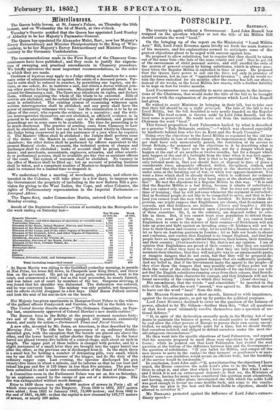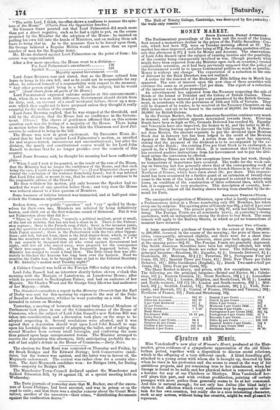POSTSCRIPT.
SATURDA Y.
The country is again without a Government : Lord John Russell has resigned on the question whether or not the title of his Militia Bill should contain the word "local."
On the bringing up of the report on the Ministerial " Local Militia Acts" Bill, Lord JOILN Rossznn again briefly set forth the main features of his measure, and his explanations seemed to anticipate some of tho gravest objections about to be urged with success against him. He proposed to allow substitutes, but to require that they should be taken out of the same lists—the lists of the same county and year : thus he got rid of the onerousness of strict personal service, and still avoided the evils of the system of general evasion by hiring substitutes, which is always prac- tised when the Regular Militia is embodied in time of peace. He proposed that the Queen have power to call out the force not only in presence of actual invasion, but in case of " apprehended invasion "--' and he would re- tain the force embodied for six months after the enemy has left our shores, instead of six weeks, as the Local Militia law enacts, with a further liability to be kept on foot for twelve months.
Lord PALMERSTON rose ostensibly to move amendments in the instruc- tions of the Chairman, that would make the title of the bill to be brought in-accord with the explanation of its provisions which Lord John Hutsell had given.
He wished to assist Ministers in bringing in their bill, but to take care that their bill should be on a right principle. The title of the bill is for a Local Militia, but the bill described is very nearly founded on the Regular Militia. The local system is thrown aside by Lord John Russell, but the local name is preserved. He would leave out from the instructions to the Chairman the word " local."
This formal proposition Lord Palmerston backed by what is described as a genuine " Rule Britannia oration,"—" which was cheered especially by landlords behind him who live in Kent and the South Counties."
Going over the objections to the Local Militia as regulated by the old law —its immobility in case of sudden danger, its impermanency when the dan- ger shall have only momentarily passed, the restriction of its service to Great Britain,—he summed up the objections to it by describing what is really wanted. " We have now to provide, not for a danger which may happen at the end of six months or twelve months, but for a danger which may happen at the end of a fortnight from the time when it was first appre- hended. (Loud cheers.) Now, how is that to be provided for? Why, the only rational mode is, that you should have at disposal in time of peace a considerable force, adequately officered, drilled, disciplined, clothed, and armed, and that this force should be kept ready at the shortest notice to act under arms at the breaking out of war, or when war appears imminent. You want a force which shall be already drawn, which is sufficient for ordinary purposes, and which you can lay your hand upon at the shortest possible no- tice.' He met the objections to a Regular Militia in this way. "It is said that the Regular Militia is a bad thing, because it admits of substitutes ; that you cannot rely upon your substitute ; that he does not appear at the time of training ; that he will not come whenever the regiment is embodied ; that in Scotland people do not like to be compelled to serve, and that in Ire- land you cannot trust the men who may be enrolled. To listen to these ob- jections, one might suppose that Englishmen are cheats, that Scotchmen are cowards, and that Irishmen are traitors. (Cheers and laughter.) All the objections I ever heard are founded upon a practical distrust of the people of these countries. Sir, I, on the contrary, am disposed rather to con- fide in them. But, if you cannot trust your population to defend them- selves, you must give them up. (Loud cheers.) If you cannot trust Englishmen to come to the defence of their country—if Scotchmen will not take up arms and fight against an invading army—if Irishmen will not be true to their Queen and country—why, let us send for a Russian force at once ; let us have an Austrian garrison in London ; let us hide our heads in shame and confusion, and confess that England is no longer England, and that her people have no longer spirit to defend themselves, their homes? their families, and their country. (Continued cheers.) Sir, that is not my opinion. I am of opinion that Englishmen are proud of their country ; that they are sensible of the value of what they have to defend ; that they are fully determined to maintain their liberties ; that they will not give way to an unreasonable panic, or imagine dangers that do not exist, but that they will be prepared de- liberately to guard themselves against dangers that are sufficiently probable. And my belief is, that if the Government make the appeal to the people—if they show them the dangers that may possibly arise—if they point out to them the value of the stake they have to defend—I for one believe you will not find the English substitutes running away from their colours, that Scotch- men will maintain their character for courage, and that Irishmen will not be found unworthy of the country to which they belong." (Loud cheering.)
His amendment, that the words " and consolidate " be inserted in the title of the bill, after the word " amend," was agreed to. He then moved. to leave out the word "local" from the title.
Mr. MILNER Guisms made a short speech, listened to with impatience, against the invasion-panic, as got up by parties for political purposes. Lord Jour/ RUSSELL declined to enter on the question of the balance of power, alluded to by Mr. Gibson—further than this, "that all questions of that kind must ultimately resolve themselves into a question of na- tional defence."
" If, in spite of the declaration annually made in the Mutiny Act of our desire to maintain the balance of power, we should resolve to stand tamely by and allow the other powers of Europe to pursue their own course uncon- trolled, we might enjoy an ignoble quiet for a time, but we should finally find ourselves isolated, and obliged to defend ourselves under the most dis- advantageous circumstances."
He then went into the specific objections of Lord Palmerston, and argued that his measure proposed to meet those very objections by its particular frame ; while he pointed out that Lord Palmerston had evaded the real question at the bottom of the difference between him and the Government— the question of substitutes. "If you ballot for Militia, and compel all the men drawn to serve in the ranks—be they farmers' or gentlemen s or mer- chants' sons—you doubtless would secure an efficient body, but the hardship of the service would be intolerable." In conclusion, Lord John said—"If, notwithstanding the objections I have urged, the House conceives the noble Lord's plan to be the best, I advise them to adopt it, and alter that which I have proposed. But what I ask— and I think it is not an extravagant demand—le that we, the Ministers of the Crown, having for many weeks considered this question most attentively, and having, among other plans, investigated one with which the noble Lord was good enough to favour me some months back, and come to the conclu- sion that our plan is the best and the least liable to objection, should be allowed to introduce it."
Mr. DISRAELI protested against the influence of Lord John's extraor- dinary speech-
"The noble Lord, I think, too often shows a readiness to menace the opin- ions of the House." (Cheers from the Opposition benches.)
Sir GEORGE GREY pointed out that Lord Palmerston did much more than put a direct negative, such as he had a right to put, on the course proposed by the Minister for the adoption of the House : he insisted on putting his own bill into the bands of Ministers, and on making them ask leave to bring that in. As to the measure thus to be forced upon them, Sir George believed a Regular Militia would cost more than an equal number of men for the Regular Army. Mr. IIUME declared against Lord Palmerston on the point of form : his course was unprecedented.
After a few more speeches, the House went to a division—
For Lord Palmerston's amendment 136 Against it 125 Majority against Government —11
Lord Jonas RUSSELL rose and stated, that as the House refused him leave to bring in his own bill, and as he could not be responsible for any other, he relieved himself of a responsibility with respect to the measure. " Any other person might bring in a bill on the subject, but he would not." (Loud cheers from all parts of the House.) Lord PALMERSTON expressed extreme surprise at this announcement ; that, when there was so little difference, Government should shrink from its duty, and, on account of a small incidental failure, throw up a mea- sure which they ought not to have proposed unless they thought it really essential for the welfare of the country.
Lord Joule Resszu, replied, that he was stopped at the threshold, and told by the division, that the House had no confidence in the Govern- ment. (Cheers.) The cheers of gentlemen affirmed that on this serious question such was the feeling of a majority of the House. There being no motion before the House, he moved that the Chairman and Lord Pal- merston be ordered to bring in the bill.
The House was now in great excitement. Sir BENJAMIN HALL de- clared that he had voted against Lord Palmerston's motion, as uncalled for and unprecedented, uncourteous and unconstitutional ; but after the division, the manly and constitutional course would be for Lord John Russell to declare that he no longer presides over the councils of this co tryun. Lord Joins Resserm said, ho thought his meaning had been sufficiently plain-
" When I said I took it for granted, as the result of the vote of the House, that the Ministry had no longer the confidence of the House, and that such being the case, I could no longer continue."—[Loud Ministerial cheers pre- vented the conclusion of the sentence from being heard ; but it was inferred that Lord John said, or meant to say, that he could no longer continue to be the responsible adviser of the Crown.] He then withdrew his motion, put only because the Speaker bad re- marked the want of any question before them ; and very soon the House was reduced almost to a bare quorum of Members.
Some business of inferior interest was transacted, and at half-past nine o'clock the Commons adjourned.



























 Previous page
Previous page